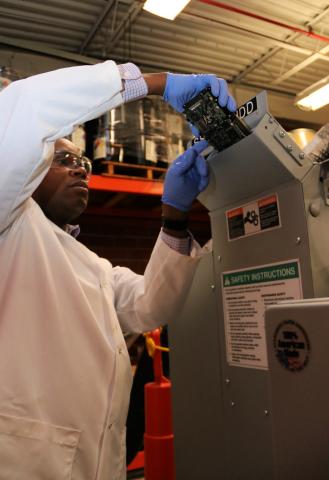Research into recovery of rare-earth materials from electronic waste by

the Critical Materials Institute (CMI) at Ames Laboratory is getting a boost with the purchase of an industrial shredder than can quickly turn obsolete hard drives into a mound of pulverized scrap. The Allegheny SelectShred commercial hard drive shredder, funded by the Iowa Board of Regents, will handle both hard disk drives and solid state drives at a rate of up to 2,700 drives per hour.
The Critical Materials Institute specializes in the recovery and reuse of rare-earth metals, which are high-demand ingredients in a wide range of modern technologies like computer hard disk drives, electric vehicle motors, and wind turbine generators. CMI developed a new acid-free rare-earth magnet recycling process that recovers more than 99 percent purity rare-earth elements from recycled e-waste. Rare earth elements were selectively removed from the e-waste without the need to pre-sort or pre-concentrate the magnet content of the materials, further reducing steps and costs.
“The difficulty with traditional hydrometallurgical methods for rare-earth magnet recycling is that they rely on the use of hazardous mineral acids, and this presents a number of problems from an economic and environmental standpoint,” said Ames Laboratory scientist Ikenna Nlebedim. “They produce toxic fumes; the acids need to be contained, and so do acid-contaminated wastes.”
Other valuable by-products of e-waste components can be recovered for further recycling including copper, aluminum, nickel and other metals or their composites.
“Rare earth contents in most e-wastes are highly diluted, and available recovery methods are rarely profitable” said Ames Lab assistant scientist Denis Prodius. “To be economically viable, a recycling process should include fewer steps, be environment-friendly, and produce other marketable materials as byproducts. Our recycling process fits perfectly into these requirements.”
One problem the CMI researchers faced was having access to a supply of shredded e-waste and the ability to control that part of the process.
“Without knowing the composition of the hard drives before shredding, we weren’t sure how much of the material we were actually recovering,” Nlebedim said. “Now we can more accurately determine and optimize the efficiency of our recycling technology."
The researchers have a ready supply of hard drives – a pallet full in fact – from Ames Laboratory’s Information Technology department. Shredding the hard drives actually provides the Lab a valuable, up-to-date method for disposing of hard disk drives, compared to the hole-punch and off-site recycling method previously used.
The Critical Materials Institute is a Department of Energy Innovation Hub led by the U.S. Department of Energy's Ames Laboratory and supported by the Office of Energy Efficiency and Renewable Energy’s Advanced Manufacturing Office, which supports early-stage research to advance innovation in U.S. manufacturing and promote American economic growth and energy security. CMI seeks ways to eliminate and reduce reliance on rare-earth metals and other materials critical to the success of clean energy technologies.
